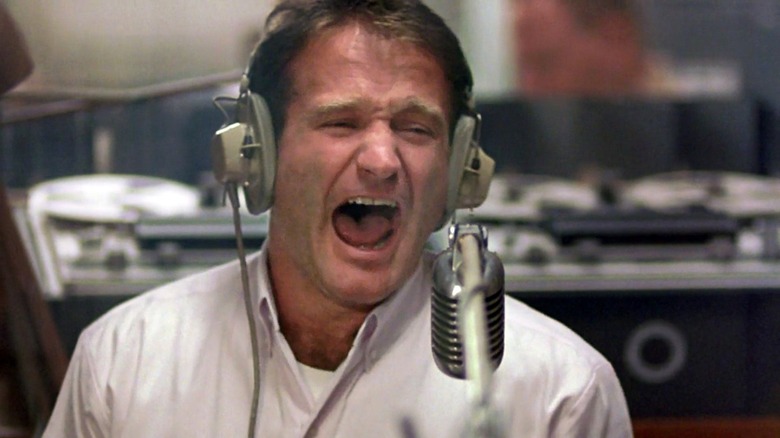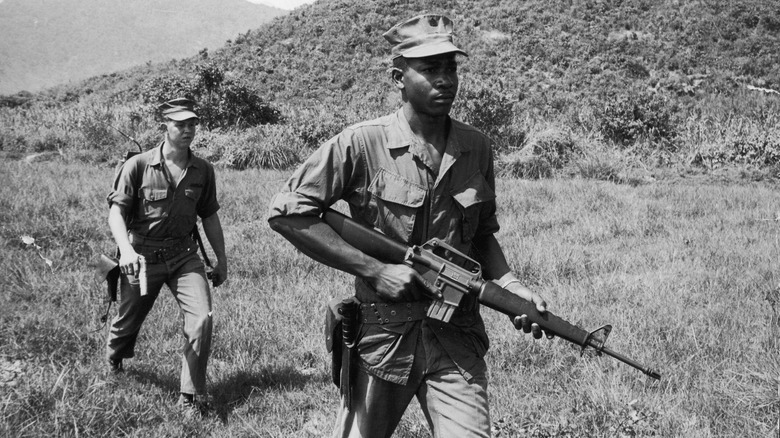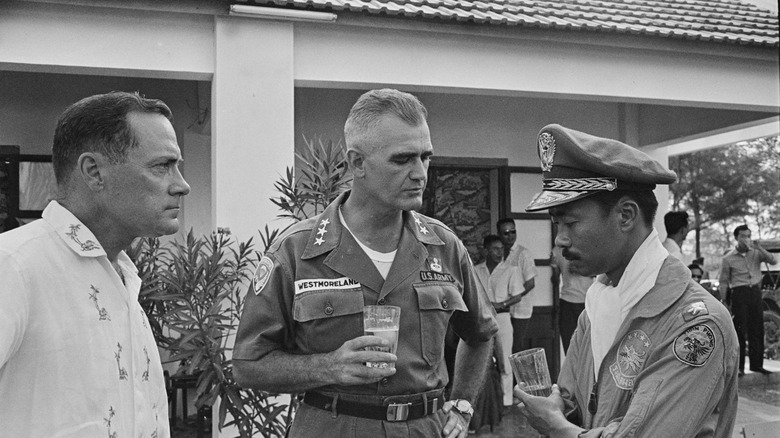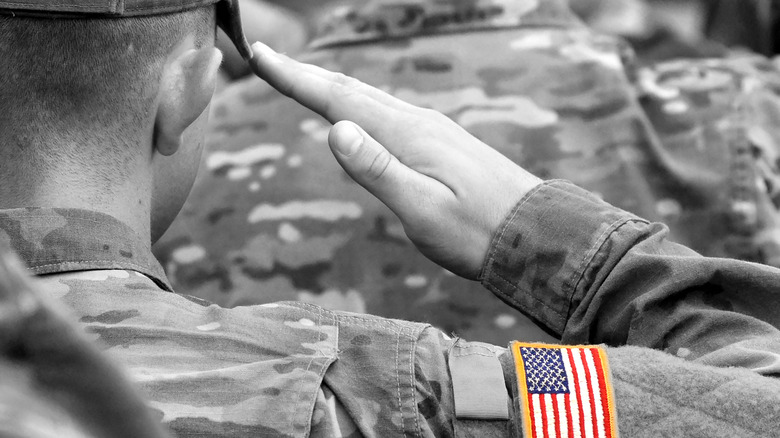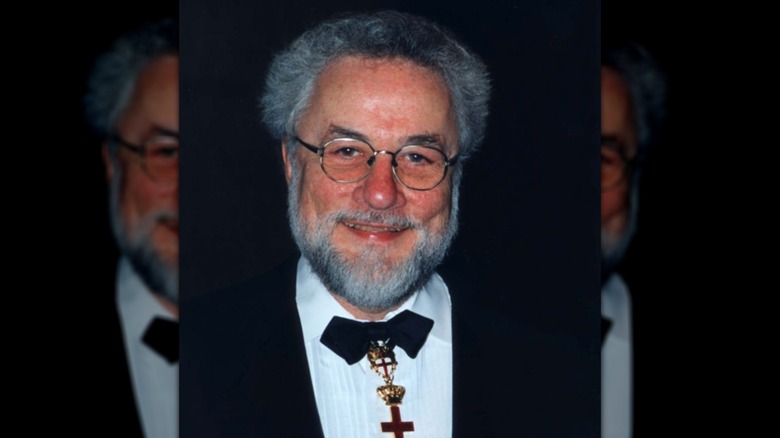The Real Person Behind Robin Williams' Character In Good Morning Vietnam
War is Hell, as the old saying goes. Nevertheless, war can also be a source of comedy –- often black comedy or gallows humor, but comedy nonetheless –- when viewed through the right lens. For example, Korean War vet Richard Hooker famously wrote the novel MASH about the experiences of U.S. Army doctors during the war, and the novel deals mostly with the men pursuing women, bending the elbow, and generally raising hell. It also became a movie and later, one of the most popular TV series of all time.
Hooker wasn't the only war veteran to mine his war experiences, some of them comic, for the screen. Back in the 1970s, according to Den of Geek, a man who had served in Vietnam as a radio DJ got the idea to create a TV series about his experiences –- a cross between the TV version of "M*A*S*H*" and "WKRP In Cincinnati," as he called it, according to Mercury News. The TV show didn't materialize, but it did become the basis for the 1987 film "Good Morning Vietnam," starring Robin Williams.
The similarities between the real Adrian Cronauer, and the version of him played by Robin Williams, likely begin and end with the fact that Adrian Cronauer really was a DJ who played rock 'n' roll in Vietnam. The rest –- most of it, anyway -– is fiction.
Cronauer Really Did Say, 'Good Morning Vietnam!'
The biggest similarity between Adrian Cronauer and how he was portrayed by Williams in the movie is in the film's title and main tagline: "Good Morning Vietnam!" Or, perhaps more accurately, the drawn-out, multiple-syllable, almost-sung catchphrase, which can't really be spelled with pixels on a screen (but you get the idea). Cronauer really did introduce his show that way.
Part of that, according to NPR News, was a reaction to the impossibly-dull, by-the-book nature of Armed Forces Radio when he arrived in Saigon. "If you've seen the film, you'll notice at the very beginning there was a very dull, dry, boring, soporific announcement about how to get your hold baggage if you'd lost your duffel bag or your trunk out of Tan Son Nhut Air Base. That is as accurate [a] depiction as is humanly possible of what the station sounded like when I got there. And one of my aims was just to make it sound more like a stateside station," he said.
So for a few months from 1965 to 1966, every morning at 6 a.m., Cronauer would begin his "Dawn Buster" radio show with the famous tagline. After he left Vietnam, subsequent DJs would continue to use the line, according to The New York Times.
The Reaction From The Soldiers Was Mixed
Cronauer admitted, via The New York Times, that his goal, and that of his superiors at Armed Forces Radio, was to give the soldiers serving in the war as much normalcy as possible. "Along came the military and literally picked them up, took them halfway around the world, and dropped them into a totally alien environment. Culture shock would set in with a vengeance. And it was our job — or as they like to say in the military, our mission — it was our mission to be an antidote to that culture shock by giving them something familiar to listen to," he said.
Not every morning in Vietnam was a good one, and sometimes, when the soldiers were greeted with their cheery introduction, they responded with considerably less cheer. "I found out later on that many times the GIs, although the program was popular and they enjoyed it, if I'd do the good morning, Vietnam, on a particularly bad day, they'd boo and hissed, and occasionally some would yell at their radio the GI equivalent of 'Get stuffed, Cronauer,'" he said, via NPR News.
Censored News
One aspect in which the movie differs from reality involves the censorship of the news. As Cronauer explained to NPR News, there's a scene in the film where Robin-Williams-as-Adrian-Cronauer wants to tell his listeners about a bombing at a local restaurant that killed a number of American soldiers. However, an on-site censor refuses to allow it.
In fact, the censors weren't on-site at the radio station: censorship was handled over the phone. And Cronauer did want to recount the story of the bombing at a restaurant, but he was thwarted by his superiors. Cronauer had witnessed it himself, but he says when he talked it over with his superiors, he was denied permission to report it because there hadn't been official confirmation. Cronauer countered that he had witnessed the event himself, having literally seen "heads severed from torsos," but he couldn't report on it because there had been no official confirmation.
By The Book
Adrian Cronauer may have brought some degree of normalcy, however slight, to the lives of the men and women serving in the Vietnam War. He did this by trying valiantly to make his Saigon radio station as much like a stateside station as possible, as The New York Times reports, fighting bureaucracy and red tape along the way.
He did do most of that, but not with the reckless abandon that Williams brought to the role. Decades later, Cronauer was clear that, at the end of the day, he was a military man who did things by the book. And there was a reason for that. "Those of you who have been in the military know that if I had done stuff that Robin Williams did in that movie, I'd still be in Leavenworth," Cronauer once said, via USA Today. Further, Cronauer notes that the movie was never intended to be a biography; seeing it through that lens, he rather enjoyed it. "It was intended to be a piece of entertainment, and it certainly was that. It was nominated for an Academy Award and you don't get much better than that," he said.
Adrian Cronauer After 'Good Morning Vietnam'
By the time Robin Williams signed the contract to portray Adrian Cronauer based, however loosely, on the latter's experiences in Vietnam, he had been a civilian for two decades. Specifically, according to Newsweek, he'd been working in radio –- the field he worked in before and during Vietnam. He'd also taught broadcasting in higher education and had recorded a few commercials.
The money he earned from selling the rights to his story was enough to pay for his education in law school. He got his law degree from the University of Pennsylvania, according to The New York Times, and he spent his remaining years advocating for veterans, including by serving as an adviser to the Defense Department's Prisoner of War/Missing in Action Office and on the board of the National D-Day Memorial. He was also, like the aforementioned Richard Hooker, a lifelong Republican, and worked for various conservative causes in his law career. Cronauer died in 2018 at the age of 79.
